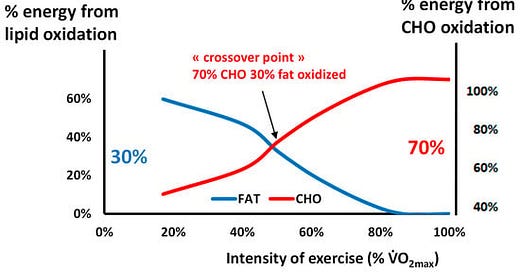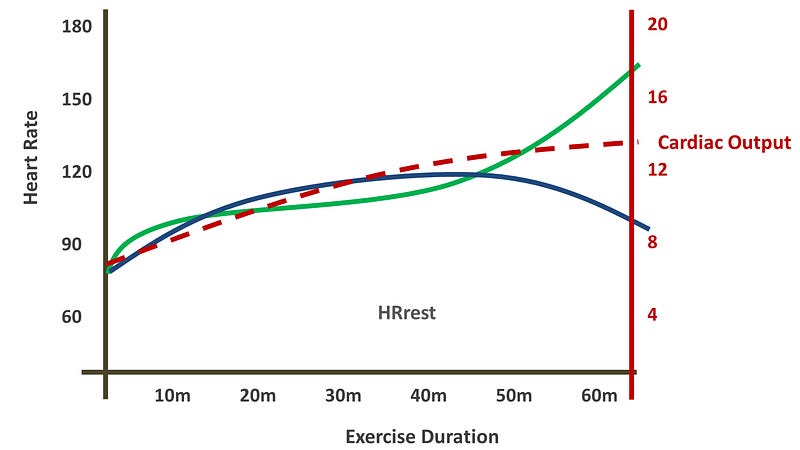No intro, jumping right in. I get a lot of questions on fueling and when/what to eat in relation to running.
Here we go:
Pre Run
This largely comes down to when you are running during the day and what effort you will be running at.
Morning Runs Easy:
Carb or not to carb?
This is where you can experiment with fasted training, in order to help adapt your body to fat oxidation (burning fat as a fuel). When waking up in the morning, if you haven’t eaten for 10-12 hours, this is generally considered a “fasted state” in a training sense, and regularly doing this on your *easy* runs will help adapt your body to fat oxidation.
Issues arrive when you leave the Zone 1-1.5 (on the 5 zone HR model) and start burning more carbs as a fuel. You can quickly send yourself into a spiral and bonk on a training run. If you plan on running fasted, keep it easy as possible, and bring a gel as a backup.
Hydration:
In the morning, you will wake up dehydrated, there is no avoiding this. Regardless if you run fasted or not, always hydrate with ~36oz of water AND electrolytes. Primarily sodium, magnesium, potassium. LMNT, Skratch, Marten, BPN, Tailwind, all make solid electrolyte powders that offer zero calorie (just electrolytes) and added carb options.
If you are running moderately to hard in the morning, I would add even a touch more water, give yourself an extra 15-20 minutes in the morning for your body to absorb the added hydration and always add carbs here. When we are running above an easy pace, we are purposely trying to burn carbs and stimulate glycolysis *for performance*. Meaning burning carbs is good, therefore fueling pre run with carbs is also a good idea.
You can do this with carb/electrolyte powder or food. A food option every runner keeps in their quiver is the toasted bread + peanut butter + banana + honey. Extremely easy-to-digest carbs and tastes good! Sitting light is the goal, not the leftover pizza from the night prior.
TLDR;
Morning easy runs —> Can be fasted or not. I would argue you should grow your fitness before testing out a fasted run, as most people will drift out of zone 1-2 and start burning carbs (that they don’t readily have).
Anything hard-moderate —> Consume carbs 30-60 minutes out from running. Can be powder form or real food.
Intra Run
Intra run fueling will be different from runner to runner.
Calorically:
Some runners may be *very good* at burning fat and not need a single calorie when running 90+ minutes (do not try this). These are usually advanced marathon runners or experienced ultra runners.
New runners will may not be able to run at an effort inside of the zone where you are burning majority of fat for fuel. This will mean for any run over 60 minutes, an intra-run fuel could be a good idea, and any run that will be 90 minutes or over—calories mid run are needed.
The general rule of thumb is to consume one gel every ~40 minutes. One “gel” is usually 90-100 calories and 23-24g of carbs. Here is an example, I do not endorse this brand or even use this brand:
Another good way of looking at it is if you’re new and running 60 minutes, take one at the half way point (or don’t at all). If running 90 minutes, take one at the half way point (45 minutes).
If running over 2 hours, take one every ~40 minutes for the duration of your run.
Intra Run Hydration
Most new runners have an extremely low amount of blood volume (this will increase with time).
Blood volume in the context of running refers to the total amount of blood circulating in a runner's cardiovascular system. This is an important factor for us because blood volume directly impacts the body's ability to deliver oxygen and nutrients to working muscles.
As you run more, your body will adapt and blood volume will increase, as you produce more red blood cells and plasma.
Why this matters? As you become dehydrated, the plasma in your blood also decreases, which increases your heart rate.
Cardiac Output = Heart Rate * Stroke Volume
Where the blue line is SV, green line is HR, and dotted red is CO.
As you run, you begin to get dehydrated. As you get dehydrated, there is less plasma in your blood, and this decreases the amount of blood available to return to the heart (flow). To counteract this, your heart rate increases to maintain the same effort (cardiac output), see above formula.
To front run your bodies response of increasing your HR due to dehydrated and lower plasma in your blood, you can carry water with you while running.
This can be small 8oz, or you can wear some piece of kit (belt/vest/handheld) to carry more. Whatever it is, don’t feel ashamed you need to bring it, water is life! Keep that HR down.
A normal fit/athletic male can sweat 800ml-1L on a hot day, this can wreak havoc on even the fittest of us. Bring enough water to mitigate the damage at times. This can mean a running belt where you stuff a 500ml soft flask inside of if you have to.
Post Run
FOOD IS RECOVERY.
Protein:
Stimulate muscle protein synthesis. Protein is essential for repairing and building muscle tissue. Consuming protein after exercise provides the necessary amino acids for this process. And FYI, your muscle tissue is broken down after a run.
After a run, your body enters a catabolic state where it breaks down muscle protein. Consuming protein post-run helps to shift the body back into an anabolic state, where muscle building occurs, thus preventing muscle loss and promoting recovery.
Not enough runners do this! Too many force feed carbs without proper protein intake. Get yourself out of a catabolic state ASAP.
This added protein intake also helps stabilize blood sugar levels post-run, preventing spikes and crashes that can lead to energy dips and cravings.
Carbs:
After exercise, your muscles are depleted of glycogen (the stored form of glucose). Consuming carbohydrates helps replenish these glycogen stores, which is crucial for recovery and staying injury free.
When carbohydrates are consumed with protein, the insulin response is enhanced. Insulin is a hormone that helps with the uptake of glucose into the muscles and also promotes the uptake of amino acids (the building blocks of protein) into muscle cells. This combined effect accelerates both glycogen replenishment and muscle repair.
Additionally, carbohydrates trigger insulin release, which helps absorb nutrients, while protein stimulates the release of glucagon, a hormone that balances blood sugar levels by promoting the release of glucose into the bloodstream. Consuming carbs and protein together helps maintain a balanced hormonal environment for muscle repair. From this balance, you see a quicker drop in cortisol post run.
As always message me any questions!
-BTR







I really must say, you have the best content. Every time I’m wondering about something related to running, boom, you have a new thread about it. This fueling thread is perfect. Thanks for the great content!